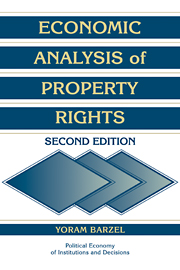Book contents
- Frontmatter
- Contents
- Series editors' preface
- Preface to the second edition
- Preface to the first edition
- Introduction
- 1 The property rights model
- 2 The public domain: Rationing by waiting and price controls
- 3 Contract choice: The tenancy contract
- 4 Divided ownership
- 5 The old firm and the new organization
- 6 The formation of rights
- 7 Slavery
- 8 Wealth-maximizing constraints on property rights
- 9 Property rights and non-market allocation
- 10 Additional property rights applications
- 11 The property rights model: Recapitulation
- References
- Index
Introduction
Published online by Cambridge University Press: 05 June 2012
- Frontmatter
- Contents
- Series editors' preface
- Preface to the second edition
- Preface to the first edition
- Introduction
- 1 The property rights model
- 2 The public domain: Rationing by waiting and price controls
- 3 Contract choice: The tenancy contract
- 4 Divided ownership
- 5 The old firm and the new organization
- 6 The formation of rights
- 7 Slavery
- 8 Wealth-maximizing constraints on property rights
- 9 Property rights and non-market allocation
- 10 Additional property rights applications
- 11 The property rights model: Recapitulation
- References
- Index
Summary
In the slave societies of the American South and the West Indies, as well as in others, slaves consistently – albeit rarely – bought their contracts from their owners in order to redeem themselves from slavery. In these societies the law afforded owners virtually absolute rights over their slaves, only seldom granting any legal rights to the slaves themselves; consequently slaves were not legally entitled to own the property necessary for self-purchase. There was no legal barrier or authority to stand in the way of owners' retaining both slave and freedom money. Nevertheless self-purchase, whereby slaves acquired legal rights to their own labor, did occur.
As will be elaborated upon in Chapter 7, the study of property rights and of the costs of transacting can yield an explanation as to why slaves were able to buy their freedom; such explanations can be tested against the facts. The property rights model I develop in this book can provide explanations of an array of such phenomena, which standard economic theory cannot successfully address. These explanations range from identifying the reasons behind the choice between wage and piece-rate contracts to pinpointing the conditions under which charity is more efficient than profit-seeking behavior.
In the following chapter, I shall define “property rights” and introduce some of the central ideas of this book. In Chapter 2, the examination of the gasoline shortage of the 1970s illustrates the usefulness and importance of the property rights framework and familiarizes the reader with its mechanics.
- Type
- Chapter
- Information
- Economic Analysis of Property Rights , pp. 1 - 2Publisher: Cambridge University PressPrint publication year: 1997

